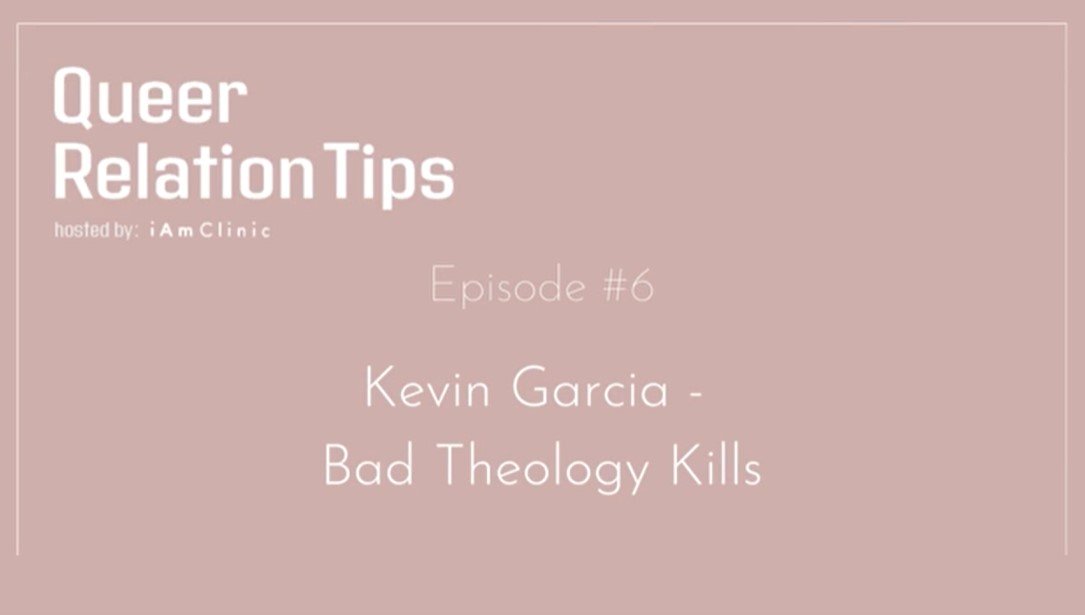Episode Summary
Host Isaac Archuleta sits with Kevin Garcia, life coach, content creator, queer person of faith, host of the podcast A Tiny Revolution, and author of Bad Theology Kills: Undoing Toxic Belief & Reclaiming Your Spiritual Authority. Their conversation delves into the theological trauma Kevin has experienced and how it affected his idea of himself and what it means to be a sexual being. Kevin allows his vulnerability to take us into his sex life, dating life, and mental health journey.
For information about how to become a guest, visit us at iAmClinic.org.
Embracing Queerness and Overcoming Religious Trauma With Kevin Garcia
For a long time, even after coming out, I struggled with feelings of shame and vulnerability in the bedroom. As a queer person of faith, the weight of religious trauma and societal expectations had taken a toll on my mental health. However, my journey towards self-acceptance has been transformative, and I am now able to embrace my queerness with grace and compassion. In this blog, I will share my story, along with the lessons I’ve learned, in the hope of empowering others to find their own path to self-acceptance. Learn more about faith counseling
Breaking Free from Toxic Theology
Growing up in a religious environment, I was bombarded with toxic theology surrounding sex and relationships. According to this narrative, sex was only acceptable between one man and one woman within the confines of marriage. Anything outside of this strict definition was deemed immoral and sinful. As a queer individual, I was made to feel inherently wrong and was constantly at odds with myself, torn between my desires and the expectations imposed upon me.
One-liners and Devastating Messages
The damaging messages I received during my formative years left a lasting impact on my mental health. I vividly remember my mother warning me not to have sex with a girl because it meant more to her than to me, reinforcing the belief that my desires were somehow lesser and not to be taken seriously. Additionally, the purity culture teachings further deepened my sense of shame, instilling a fear of ruining my purity and worth through sexual expression.
The Struggle with Identity and Mental Health
Growing up as a high-functioning depressive person, I coped with anxiety and depression throughout my college years. My queerness and unresolved trauma made it difficult for me to enjoy sexual experiences or be vulnerable in relationships. My mental health took a toll, leading to panic attacks, insomnia, and substance abuse as I attempted to escape the pain and shame I carried.
Navigating Relationships and Healing
The journey towards healing began when I sought professional help and found a therapist who could support me on my path. I began therapy, and my therapist prescribed medications to help stabilize my mental health. Initially, I experienced side effects like anger spikes, but as my medication was adjusted, I found a newfound sense of clarity and peace. This allowed me to explore my spirituality and emotional well-being more deeply, breaking free from the chains of toxic theology.
Coming Out and Finding Community
Embracing my queerness and finding my tribe was an empowering moment in my journey. I realized the power of finding people who could celebrate and accept me for who I am. Queerness taught me the beauty of breaking down societal binaries and embracing a wide spectrum of human experiences. The LGBTQ+ community offered a safe space where I could share my story, and in turn, provide support to others who were going through similar struggles.
Embracing Vulnerability and Grace
Through therapy, self-reflection, and the love of my community, I learned to embrace vulnerability and grace. I accepted that my desires and feelings were valid and not something to be ashamed of. Embracing my identity and accepting my body became acts of self-love and self-empowerment. I found solace in the idea that I am worthy of love, regardless of societal expectations or religious dogmas.
The Path to Self-Acceptance
My journey towards self-acceptance was not linear; it had its ups and downs. But the more I opened up about my experiences, the more healing I found. I learned to let go of the shame that had plagued me for so long and to redefine my relationship with my body, my sexuality, and my spirituality. With every step forward, I discovered new layers of self-love and compassion.
Empowering Others to Embrace Their Queerness
My experiences have led me to a place where I want to support others in their journey towards self-acceptance. To all the queer youth and individuals struggling with religious trauma, I want to say this: you are not alone. Seek out communities and spaces where you can be yourself unapologetically. Reach out for professional help if needed, and remember that it is okay to take things one step at a time.
Conclusion
Embracing my queerness and overcoming religious trauma has been a transformative process. Through therapy, self-discovery, and the support of my community, I have learned to love and accept myself unconditionally. My journey towards self-acceptance continues, and I hope that by sharing my story, I can inspire others to find their path towards embracing their authentic selves. Remember, you are worthy of love, acceptance, and happiness, just as you are. The revolution of self-acceptance starts within, and I am grateful for every step I have taken on this journey.







